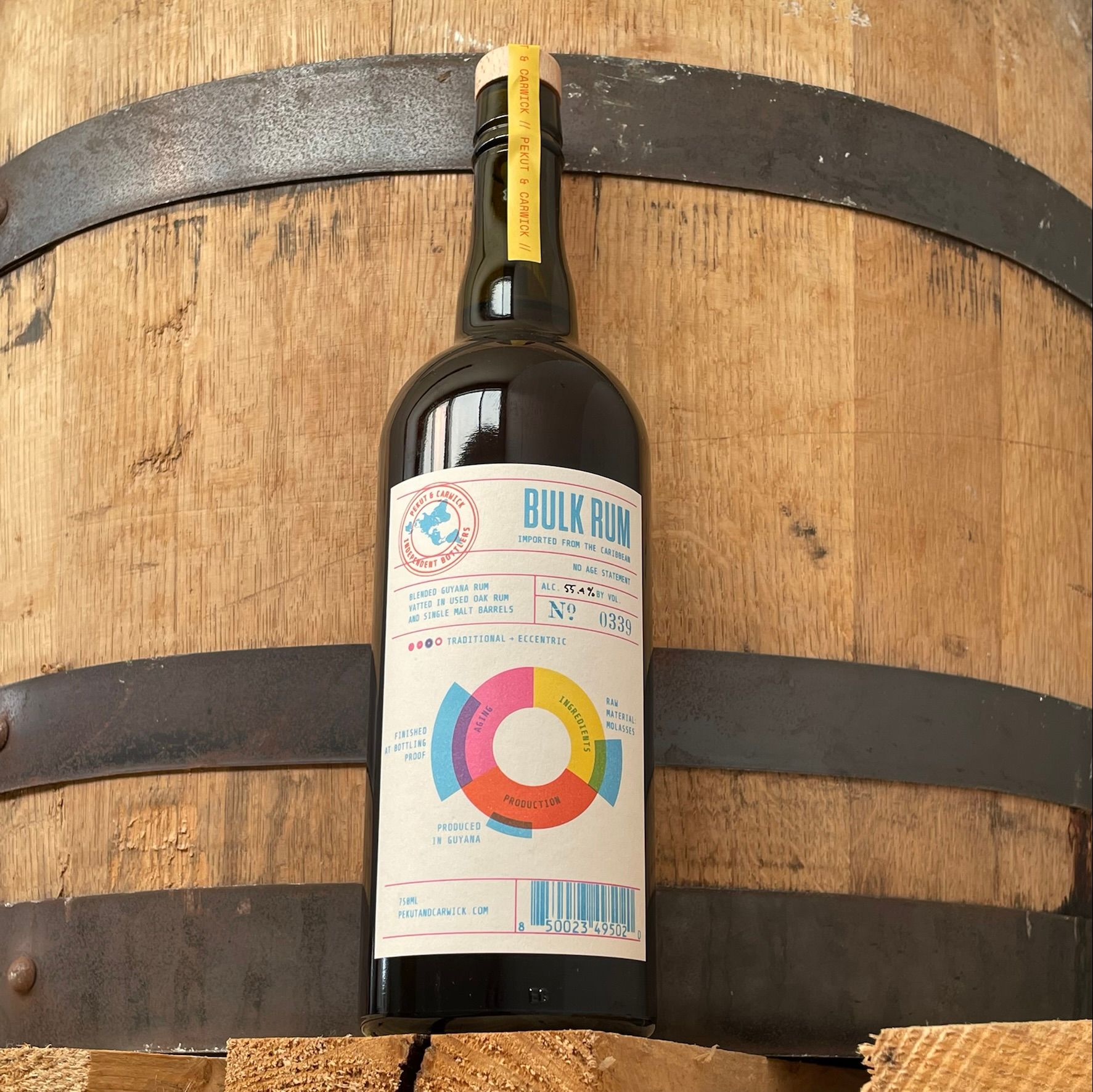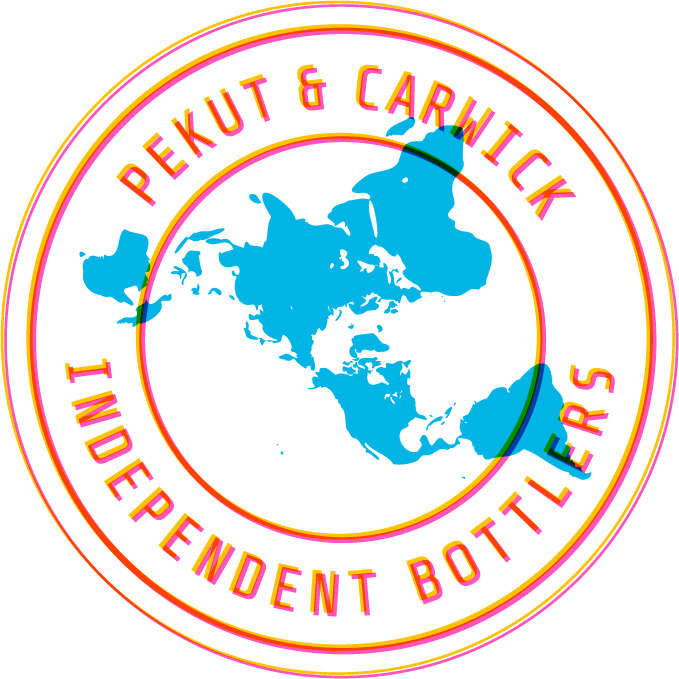Bulk Rum

Raw material: molasses
Origin: Guyana
Distillation: blend of pot and column still
Maturation: no age statement, blend of aged and unaged
Proofing: lowered to bottling proof in used single malt and rum barrels
Nose: sugar, light caramel, cake donut, slight nutty funk
Palate: dry, mouthwarming, "chewy" maltiness, vanilla, oak
RELEASE NOTES: This bottle is a great stepping off point for some of the foundational concepts that inspired us to form Pekut and Carwick Independent Bottlers. We bring a deeper conversation to the spirits you enjoy, and there's a lot to talk about with this one.
We bottled under the brand name BULK RUM because that's what it is - commodity rum that arrived in your hands from across oceans via bulk conveyances.
For a long time, the Caribbean rum industry relied heavily on commodity value streams. This means that distilleries shipped bulk tankers of rum to brokers and brand owners abroad, where value-added operations like aging, bottling, branding, and market premiumization happened outside the country of origin. As a consumer paying attention to where your dollar goes, this means that more of the money you pay for your bottle of imported Caribbean rum ends up outside the Caribbean.
At face value, there's nothing wrong with the idea of international trade in bulk goods. It makes sense for bulk rum to be passed from business to business across international boundaries. For a new spirits brand venturing into rum, buying bulk from a broker was the easiest path to back up our (excellent) marketing with a quality product.
But look a little further up the value stream. Give a thought to the history of the economies this product touched before you bought it - from a distiller in a former Dutch and British colony, to a blender in Amsterdam, to a bottler in Berkeley. It's hard NOT to see this trade route as only a minor evolution from the colonial economic model.
Through efforts of organizations like the West Indies Rum & Spirits Producers' Association and its members, producer-owned brands (brands that can keep a larger portion of the price you pay in their local economies) have gained more traction and acceptance in international markets in the last two decades. Think of all the times you've heard someone say "rum is the next big thing" - these folks are actively pushing this agenda to the bartenders, bloggers, and the industry hypers of the world.
Still, buying bulk spirits to kick off your new "craft" spirits brand is nothing new, and bulk rum trading clearly still exists today - I mean, if a scrappy independent bottler like us can get their hands on some good bulk Guyana rum, you know there's a bigger market out there. And it's happening with other spirits, too. There are plenty of distillers out there waiting for their own bourbon to age and meanwhile selling distillate from industrial-scale producers to keep the doors open.
And there's some damn good bulk rum out there! The folks that make this stuff know what they're doing. The folks that imported and blended it know what they're doing, too, the product shows it.
Bulk Rum is a clear, pale gold blended rum (meaning it comes from both pot and column distillates), with a clean, medium intensity nose. It smells like sugar, light caramel, and the crust you get on the outside of a dense cake or plain donut. There's a hint of something we were tempted to call rancio (it ended up as "walnut" on the label because our monotype font appeared to say "rancid"). Generically, you could say it has just a hint of "funk" on the nose, but it’s a cognac funk, not a Jamaican rum funk. There are some fruity esters in here as well, somewhere near apricot and apple.
The palate is dry, medium intensity, and there's a mouthwarming build up in the mid palate to a "chewy" maltiness. This is from the single malt barrel we used to proof this bottling down (check out our Heritage bottling - same barrel). There are classic oak vanillin notes here too, probably from both the barrel aged components at the original distillery and from our barrels.
But there are still lots of questions about this product. For example, we can taste the classic molasses-based rum flavor components in here, but I can't offer you any transparency about these raw materials.
This gets us to sugar.
Like a lot of rum out there, Bulk Rum is made from molasses, which is a byproduct of the refined sugar manufacturing process. In fact, rum arguably only exists today because Caribbean sugar plantations needed a way to monetize their waste stream.
Modern rum distillers have three major challenges to consider when sourcing their raw materials:
Molasses is traded on the commodity market, meaning that value (and price) is driven by the market.
There is little to no traceability back through the product stream - it all gets dumped together
There is constant economic pressure on sugar refineries to extract more sugar from sugar cane
As a consumer who cares about the ethics and sustainability of their product, you probably recognize the signs of a sketchy situation here. Good luck finding the cane field that your bottle of rum came from, let alone ensuring that the folks growing and harvesting are being paid a living wage and have basic health and safety needs taken care of.
But consider also that even the basic quality parameters of this raw material change wildly over time. Batch-to-batch consistency is poor, and ever more efficient sugar extraction means less available substrate for fermentation and lower distillery yields. These are huge challenges for production, not just ethics and sustainability.
So... we've got a new, exciting, tasty product with a tangled colonial history produced from an ethically and technically challenging raw material, and zero insight into the labor and environmental practices, or even the country, where this raw material was grown.
Starting to feel a little strange about the money you spent on this bottle of rum? That's OK, it just means that you're paying attention.
But it leaves us in a bit of a quandary. Should we give up on rum? (But I love rum!!!??!)
While it might assuage our socially conscious consumer guilt, zero-sum abstinence from rum won't do anything for people who depend on the economies where molasses is produced.
So what to do?
Well, *our* first step was to catch your eye with our BULK RUM branding. Let's call this what it is. Let's talk about how we can do this better.
After that... well, we're still working on it. There is some single-origin molasses out there, there are folks working with American-grown sugar cane, and there are rums that skip the molasses step entirely (see Agricole-style rums from places like Martinique). As a scrappy new company with big ideas, we’re looking at all of these options and more to figure out how we can do rum imports better.
Every part of the rum production and import process is contending with challenges, from fluctuating molasses quality and consistency to pandemic chaos in the “just-in-time” product stream. Climate change will also certainly impact agricultural cycles, so the landscape is guaranteed to evolve as we move through it.
For my part, I hope your appreciation for complexity reaches beyond the flavors and aromas of the rum in this bottle.
Enjoy!

